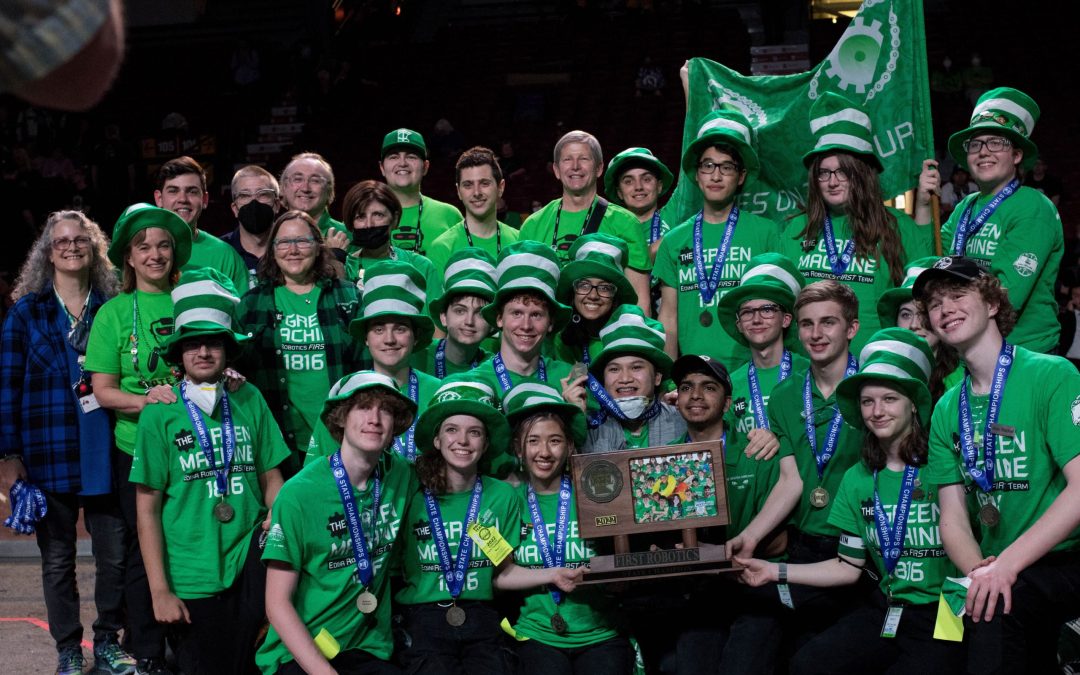2022 Season: From COVID pods to MSHSL State Champions
The COVID-19 pandemic was still very much a factor when we launched our 2022 season in summer 2021. As the summer months progressed, we edged into holding more in-person meetings and events, but it was STEM Day at the Minnesota State Fair which marked a true dividing line between incremental COVID precautions and a return to a “new normal.” Masks were still in place to keep us all as healthy as possible, but we saw each others’ faces and smiles from time to time. Our annual Team Retreat was held in-person for the first time in two years, and we competed in two off-season scrimmage events.
Not building an entirely new robot for the 2021 FIRST Robotics Competition’s virtual INFINITE RECHARGE season meant that we had to teach two classes of rookies to build a robot in one fall pre-season (September – December) before the January 2022 Kickoff. We needed a build challenge that would get everyone up to speed. Our answer, “Cargo Collaboration!” Using scrap parts, three teams of sophomores and juniors each built a robot to the specifications of a modified version of a prior FIRST Robotics Competition game. Not only did this multi-week experience serve as a preview into the 2022 build season, but all team members were once again immersed into the FIRST ethos of Gracious Professionalism and Coopertition. A November showcase for families enabled all team members to demo their mini-robots and respond to questions about their design and decision process. There were great cheers each time a robot tossed the ball across the room. All in all, it was a success!
Our 2022 Season robot, nicknamed ZAP, included our first-ever competition-ready Swerve drivetrain. Using a swerve drivetrain, in which all drive wheels are programmed and steered independently, gives a robot driver greater ability to ‘strafe’ (to move the robot in any direction). We experimented with Swerve drive during the 2020-2021 pandemic months, which gave us confidence to move forward with Swerve for our 2022 robot. We also tried two different climbing mechanisms: a telescoping climber, and one that resembles a ferris wheel. We used the telescoping climber for our first competition, the Northern Lights Regional, Duluth, MN. While we ended the competition as finalists, and won the Entrepreneurship Award, our robot was damaged. In the last moment of the last match, our robot fell from the traversal (highest) rung of our alliance’s hangar structure, landing on the side of the drivetrain. We needed to replace damaged Swerve drive modules and unbend the drivetrain framing in the few weeks we had between Duluth and our second competition in Minneapolis. We also decided to switch mechanisms, using the ferris wheel climber as well as a four-bar cargo ball intake. We had high hopes for the performance of the climber, especially, because the ferris wheel climber took 25 seconds less time to complete its hang compared to the telescoping climber, an important margin in a 2.5 minute game.
At the North Star Regional we made it to eliminations and won the Engineering Inspiration Award, granting us $5,000 from NASA and securing our registration to the FIRST World Championships in Houston, TX. We focused our time between the North Star regional and competing at the World Championship on drivers’ practice using the facilities at MURA (Minneapolis Urban Robotics Alliance), where a full-sized, FRC competition field is now permanently housed. Having access to a full-sized FRC field made the difference in getting ready for the World Championships. In Houston, we made it to the quarterfinals with the second seed alliance on the Galileo Field. Getting picked at the Championship event is no small achievement. We stood out from other teams for our ability to climb very fast and play speedy defense making it difficult for other robots to score cargo balls into the center Hub structure.
As the 2019 winners of the FIRST Championship Chairman’s Award (now known as the FIRST Impact Award), 1816 was expecting to be inducted officially into the FIRST Hall of Fame at the World Championship in Detroit in 2020. Due to the pandemic, we had to wait until spring 2022. In a flag-raising ceremony, our Team banner was proudly raised in Houston this year, alongside three other FIRST Robotics Championship Chairman’s Award winners. At the MSHSL FIRST Robotics State Championship, we finished as the 29th seed but our defensive driving and pinning skills and end-game rapid-climber stood out to the four alliances looking for robots that complemented their own. We were picked by the No. 3 alliance, captained by FRC Team 5172-Gators, Greenbush, MN, to join them and FRC 4607-CIS, Becker, MN. The Gators’ choice of us and CIS proved to be a winning combination, when we had to play and won a 2 on 3 match while the Gators’ made repairs. We took the final two matches to emerge as State Champions! We bring forward the lessons of the 2022 Season, to make our 2023 FRC season (ChargedUp!)

